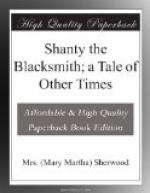The terror now expressed in the three countenances, was rapidly extending to the heart of Tamar. What can all this mean, she thought, what is there about me that thus appals them: it is their own guilt that renders them fearful; but why should I fear? now is the moment for strength of heart, and may heaven grant it to me. Having strength given her; she again demanded the just due of her guardian.
“It would be better to give it,” muttered Jacob; and Rebecca at the same time screached out, “In the name of our father Abraham, give her what she asks, master,—and let her go,—let her go to her father,—to him that has reared her, and yet disowns her,—let her go to him; or like the daughters of Moab she will bring a curse on our house.”
“Hold your tongue, you old fool,” said Jacob, “what do you know of her, and of him who was once Laird of Dymock? But, master,” he added “pay the girl what she asks, and I will go down and get back your note, and once for all we will shut our doors upon these people.”
“But I would know,” said Salmon, “I would know whence that girl has those eyes, which are bright as the bride of Solomon,—as Rachel’s,” he added, “they are such as hers.”
“Go to,” said Jacob, “what folly is this, tell the money to the girl, and let her go.”
“Jacob! Jacob!” exclaimed Salmon, “I am ruined, undone, I shall come to beggary,—five hundred and ninty-four pounds, ten shillings and sixpence,” and the teeth of the old man began to chatter, terror and dotage and cunning, seeming to be striving within him for the mastery and altogether depriving him of the power of acting.
Jacob muttered one or two indistinct imprecations, then approaching the table himself, he told the gold from the bags with the facility of a money-changer, whilst Tamar stood calmly watching him; but the serving man finding the weight too great for her, he exchanged much of the gold, for Bank of England notes, which he took out of the same trunk, and then delivering the sum into Tamar’s hands; “There young woman, go,” he said, “and never again disturb my master with your presence.”
Whilst this was going on, Salmon had kept his eyes fixed on Tamar, and once or twice had gasped as if for breath; at length he said, “And you are Dymock’s daughter, damsel, but you are not like your father’s people,—are they not Nazarenes; tell me what was she who bore you?”




